|
|
|
Sort Order |
|
|
|
Items / Page
|
|
|
|
|
|
|
| Srl | Item |
| 1 |
ID:
085122
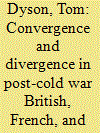

|
|
|
|
|
| Publication |
2008.
|
| Summary/Abstract |
Post-Cold War military reforms in Britain, France, and Germany have been characterized by patterns of convergence in the objectives, instruments, and institutional forums of defense policy but by divergence in temporality. These patterns of convergence and divergence cannot be fully explained by cultural approaches. Neither can they be explained solely by a focus on the role of international structure, as neo-realism posits, although the post-Cold War distribution of capabilities is driving Britain, France, and Germany toward policy convergence. Instead, the analysis builds upon the insights of neoclassical realism. Culture emerges not so much as a cause of action as instrumental and a resource for policy leaders in the domestic political and temporal management of reform.
|
|
|
|
|
|
|
|
|
|
|
|
|
|
|
|
| 2 |
ID:
074227


|
|
|
|
|
| Publication |
2005.
|
| Summary/Abstract |
The article analyses the processes and outcomes of military reforms during the two Schröder governments (1998–2005). These reforms are the litmus test for Germany's willingness and ability to play an important role in crisis-management tasks as part of NATO, CESDP and the UN. The study argues that, despite its strengths, the concept of strategic culture provides only a partial explanation of military reform in Germany. The article illustrates the strongly self-referential nature of Bundeswehr reform, despite adaptational pressures from the EU and NATO and the role of ‘international structure’. The domestic politics of base closures, ramifications for social policy, economic and financial restrictions consequent upon German unification and commitment to EMU's Stability and Growth Pact were critical in determining the outcomes of the reform processes undertaken by Defence Ministers Rudolf Scharping and Peter Struck. The study also draws out the important role of policy leaders in the political manipulation of reform as entrepreneurs, brokers or veto-players and in controlling the extent of adaptational pressure from NATO and the EU. In doing so, the article shifts the focus of leadership studies in Germany away from the Chancellor to an examination of the role of ministerial and administrative leadership within the core executive.
|
|
|
|
|
|
|
|
|
|
|
|
|
|
|
|
| 3 |
ID:
106548
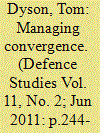

|
|
|
| 4 |
ID:
124992
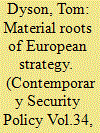

|
|
|
|
|
| Publication |
2013.
|
| Summary/Abstract |
This article undertakes a critical examination of the analytical leverage provided by the literature on strategic culture in explaining the development of the European Union's Common Security and Defence Policy (CSDP). It posits that patterns of progress and stasis in CSDP cannot be fully explained by processes of normative convergence and the resilience of national strategic cultures. Instead, the article argues that a focus on material power sheds greater light on the dynamics driving and hindering Europe's quest for military autonomy. It highlights how the 'balance of threat' is fostering both convergence and differentiation in the defence policies of Britain, France, and Germany. Through case studies of the development of British, French, and German policy towards CSDP and NATO, the article demonstrates the important roles played by energy dependency and geographical position in determining the willingness of European states to embed their defence policies in NATO/CSDP or pursue national strategic autonomy. The article argues that strategic culture can provide valuable insights into European defence cooperation; however, this contribution is best framed within the theoretical insights of neoclassical realism. By highlighting the nature of the variables determining the scope and depth of European defence cooperation, the article raises a number of policy implications for European security.
|
|
|
|
|
|
|
|
|
|
|
|
|
|
|
|
| 5 |
ID:
165354


|
|
|
|
|
| Summary/Abstract |
The post-Cold War era has witnessed the rapid expansion of organisational learning initiatives within NATO militaries, especially formal “lessons-learned” processes. The effectiveness of national lessons-learned processes in recalibrating military activity to the demands of ongoing operations has been highly-differentiated. However, the academic literature on military change and practitioner guidance has been slow to investigate the key features of best-practice in military learning. This article breaks new ground by drawing upon the literature on dynamic organisational capabilities to explore the fundamental organisational processes and activities which are necessary to implement successful lessons-learned. It examines, in particular, the organisational features which facilitate “knowledge transformation”: the effective combination of new knowledge gained from intra- and inter-organisational learning with existing organisational knowledge. The article concludes by highlighting several potential future empirical and theoretical research agendas in military learning and the importance of engagement between lessons-learned practitioners and organisational learning scholars.
|
|
|
|
|
|
|
|
|
|
|
|
|
|
|
|
| 6 |
ID:
185342


|
|
|
|
|
| Summary/Abstract |
This article examines the development and performance of formal organisational learning processes in the Ukrainian Armed Forces (UAF) during the Donbas War (2014-present). Through original empirical research conducted with UAF personnel and documentary analysis, the article develops understanding about the detail of UAF lessons-learned processes and their effectiveness in helping to recalibrate UAF activities to operational demands. The article finds that the performance of UAF lessons-learned processes during the Donbas War has, on the whole, been poor. Since the escalation of Russian aggression in 2014, some positive steps which have been taken to implement best-practices in UAF lessons-learned processes. However, the article uncovers a number of organisational activities, structures and processes which could be improved to weaken the negative impact of bureaucratic politics and organisational culture on learning. It concludes with recommendations for the further development of UAF lessons-learned processes. The article highlights the particular importance of improving the capacity of the civilian leadership to exert effective oversight of military learning and of US and NATO support for these efforts.
|
|
|
|
|
|
|
|
|
|
|
|
|
|
|
|
| 7 |
ID:
112448
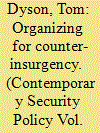

|
|
|
|
|
| Publication |
2012.
|
| Summary/Abstract |
Why do allies not adapt evenly even in time of war? This article maps and explains differentiation in the development of the stabilization and counter-insurgency doctrines of the British and Germanmilitaries during deployment in Afghanistan. In doing so the study analyses the neglected issue of the organizational capabilities of the British and German militaries to develop and apply military doctrine that is appropriate to the exigencies of the contemporary operational environment. Drawing upon documentary analysis and semi-structured interviews, this article uncovers new empirical material on the institutional reforms which have been undertaken to strengthen the adaptability of doctrine and its application in operations. It finds that while the British military's organizational capabilities were characterized by deficits at the tactical level between 2006 and 2009, recent years have seen significant improvement. In contrast, the organizational capabilities of the Germanmilitary remain stunted. While international structure is the main independent variable driving doctrinal adaptability, domestic variables exogenous to the military are the dominant intervening factor determining the development of effective organizational capabilities. Neoclassical realism provides the strongest analytical leverage in understanding the factors determining the capacity of militaries to adapt doctrine to the operational environment.
|
|
|
|
|
|
|
|
|
|
|
|
|
|
|
|
| 8 |
ID:
175458


|
|
|
|
|
| Summary/Abstract |
The post-Cold War era has witnessed the widespread development of lessons-learned processes within NATO member-states. However, practitioner guidance and military innovation studies are yet to properly investigate the insights of management studies about best-practice in lessons-learned processes. In particular, they have failed to identify the activities which enable militaries to “transform” knowledge, by effectively combining new knowledge with existing organisational knowledge. Drawing upon the academic literature on cross-functional teams and original interview research, this article examines the organisational activities which improve the crucial “remedial action” phase of lessons-learned processes. It breaks new ground by identifying six key dimensions of lessons-learned process cross-functional teams and the organisational activities which enhance their performance. In doing so, the article improves understanding about the team processes and wider organisational activities which shape lessons-learned process effectiveness. It also examines the challenges associated with encouraging well-informed oversight of lessons-learned processes by the civilian and military leadership. The article concludes by identifying a number of important research agendas on lessons-learned processes.
|
|
|
|
|
|
|
|
|
|
|
|
|
|
|
|
| 9 |
ID:
173943
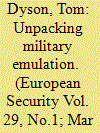

|
|
|
|
|
| Summary/Abstract |
Which organisational activities promote effective military emulation? Which variables facilitate and impede the emergence of these activities? Drawing upon the academic literatures on military change and management studies, as well as semi-structured interviews within the British and German militaries, this article identifies five key organisational activities which promote effective inter-organisational doctrinal learning. In doing so, the article improves understanding of the contribution that management studies can make to multi-disciplinary scholarship on military learning. The article examines the variables which facilitate the emergence of activities which support effective inter-organisational doctrinal learning through a case study of Bundeswehr doctrinal absorptive capacity during ISAF. It also explores the impact of these activities on doctrine development. The article demonstrates the crucial importance of active and well-informed civilian oversight of the activities which support military learning.
|
|
|
|
|
|
|
|
|
|
|
|
|
|
|
|
|
|
|
|
|